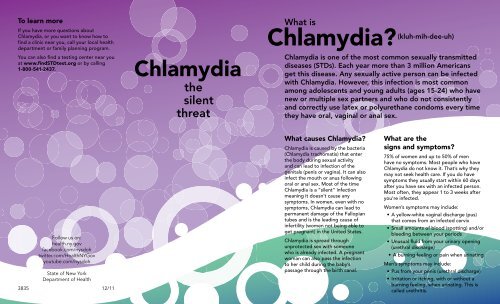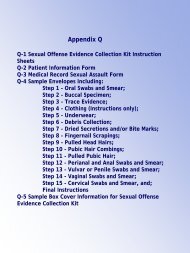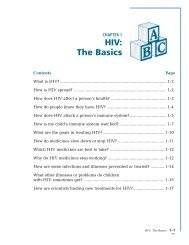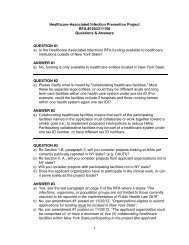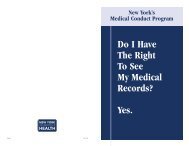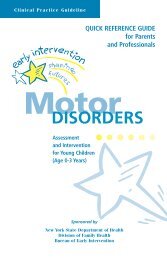Chlamydia: The Silent Threat - New York State Department of Health
Chlamydia: The Silent Threat - New York State Department of Health
Chlamydia: The Silent Threat - New York State Department of Health
Create successful ePaper yourself
Turn your PDF publications into a flip-book with our unique Google optimized e-Paper software.
To learn more<br />
If you have more questions about<br />
<strong>Chlamydia</strong>, or you want to know how to<br />
find a clinic near you, call your local health<br />
department or family planning program.<br />
You can also find a testing center near you<br />
at www.findSTDtest.org or by calling<br />
1-800-541-2437.<br />
<strong>Chlamydia</strong><br />
the<br />
silent<br />
threat<br />
What is<br />
<strong>Chlamydia</strong>?<br />
(kluh-mih-dee-uh)<br />
<strong>Chlamydia</strong> is one <strong>of</strong> the most common sexually transmitted<br />
diseases (STDs). Each year more than 3 million Americans<br />
get this disease. Any sexually active person can be infected<br />
with <strong>Chlamydia</strong>. However, this infection is most common<br />
among adolescents and young adults (ages 15-24) who have<br />
new or multiple sex partners and who do not consistently<br />
and correctly use latex or polyurethane condoms every time<br />
they have oral, vaginal or anal sex.<br />
Follow us on:<br />
health.ny.gov<br />
facebook.com/nysdoh<br />
twitter.com/<strong>Health</strong>NYGov<br />
youtube.com/nysdoh<br />
<strong>State</strong> <strong>of</strong> <strong>New</strong> <strong>York</strong><br />
<strong>Department</strong> <strong>of</strong> <strong>Health</strong><br />
3835 12/11<br />
What causes <strong>Chlamydia</strong>?<br />
<strong>Chlamydia</strong> is caused by the bacteria<br />
(<strong>Chlamydia</strong> trachomatis) that enter<br />
the body during sexual activity<br />
and can lead to infection <strong>of</strong> the<br />
genitals (penis or vagina). It can also<br />
infect the mouth or anus following<br />
oral or anal sex. Most <strong>of</strong> the time<br />
<strong>Chlamydia</strong> is a “silent” infection<br />
meaning it doesn’t cause any<br />
symptoms. In women, even with no<br />
symptoms, <strong>Chlamydia</strong> can lead to<br />
permanent damage <strong>of</strong> the Fallopian<br />
tubes and is the leading cause <strong>of</strong><br />
infertility (women not being able to<br />
get pregnant) in the United <strong>State</strong>s.<br />
<strong>Chlamydia</strong> is spread through<br />
unprotected sex with someone<br />
who is already infected. A pregnant<br />
woman can also pass the infection<br />
to her child during the baby’s<br />
passage through the birth canal.<br />
What are the<br />
signs and symptoms?<br />
75% <strong>of</strong> women and up to 50% <strong>of</strong> men<br />
have no symptoms. Most people who have<br />
<strong>Chlamydia</strong> do not know it. That’s why they<br />
may not seek health care. If you do have<br />
symptoms they usually start within 60 days<br />
after you have sex with an infected person.<br />
Most <strong>of</strong>ten, they appear 1 to 3 weeks after<br />
you’re infected.<br />
Women’s symptoms may include:<br />
• A yellow-white vaginal discharge (pus)<br />
that comes from an infected cervix<br />
• Small amounts <strong>of</strong> blood (spotting) and/or<br />
bleeding between your periods<br />
• Unusual fluid from your urinary opening<br />
(urethral discharge)<br />
• A burning feeling or pain when urinating<br />
Men’s symptoms may include:<br />
• Pus from your penis (urethral discharge)<br />
• Irritation or itching, with or without a<br />
burning feeling, when urinating. This is<br />
called urethritis.
Can <strong>Chlamydia</strong> cause<br />
any other problems if it’s<br />
not treated?<br />
Yes! Untreated <strong>Chlamydia</strong> in women can<br />
lead to infection in other parts <strong>of</strong> your<br />
reproductive system. This infection is called<br />
pelvic inflammatory disease (PID). If you<br />
have PID it can cause belly pain, fever, and<br />
possible infertility (the inability to have<br />
children), ectopic pregnancy (a pregnancy<br />
outside the uterus), and chronic pelvic pain.<br />
In men, untreated <strong>Chlamydia</strong> can cause<br />
urethral infection, and complications such as<br />
swollen and tender testicles (epididymitis),<br />
which may result in sterility (inability to<br />
make sperm and father children).<br />
A pregnant woman with <strong>Chlamydia</strong> can<br />
give the infection to her baby during<br />
vaginal delivery. <strong>Health</strong> care providers give<br />
medicated eye drops to ALL newborns<br />
in <strong>New</strong> <strong>York</strong> <strong>State</strong> soon after birth. This<br />
prevents the newborn from getting an<br />
eye infection caused by <strong>Chlamydia</strong> or<br />
gonorrhea. About one <strong>of</strong> every four<br />
newborn babies delivered through the<br />
birth canal <strong>of</strong> an infected woman will get<br />
<strong>Chlamydia</strong> pneumonia (lung infection).<br />
A <strong>Chlamydia</strong> infection increases your<br />
chance <strong>of</strong> getting other STDs, such as<br />
gonorrhea or HIV.<br />
How will I know<br />
if I have <strong>Chlamydia</strong>?<br />
Since most women and many men do not have<br />
symptoms, it is important for all sexually active<br />
persons to have regular examinations so that<br />
a clinician can take specimens to screen for<br />
possible <strong>Chlamydia</strong> infection.<br />
A clinician will take a sample from the site <strong>of</strong><br />
infection (e.g., urethra, cervix, rectum, and/<br />
or the eye) using a swab and then test it for<br />
the bacteria. <strong>New</strong> tests are available that use<br />
urine samples to test for <strong>Chlamydia</strong>. However,<br />
this urine testing is not available at all provider<br />
<strong>of</strong>fices. Ask your doctor if this test is available.<br />
Is there a cure for <strong>Chlamydia</strong>?<br />
Yes. <strong>Chlamydia</strong> can be easily treated and cured<br />
with antibiotics. Your provider will give you<br />
a one-time dose <strong>of</strong> azithromycin (az ith roe<br />
mye’ sin) or a week <strong>of</strong> doxycycline (dox i sye’<br />
kleen) that should be taken twice a day. Other<br />
antibiotics are available but they are not as<br />
effective. <strong>The</strong>y all need to be taken for 7 days.<br />
If you finish your medicine and you still have<br />
symptoms, return to your provider.<br />
You can<br />
have<br />
<strong>Chlamydia</strong><br />
and not<br />
know it<br />
<strong>Chlamydia</strong><br />
easily treated and cured<br />
When can I have sex again?<br />
If you have been treated for <strong>Chlamydia</strong>,<br />
you should not have oral, anal or vaginal<br />
sex until 7 days after your treatment is<br />
over. If your sex partners are being treated<br />
for this STD, you should wait to have sex<br />
until 7 days after they take all <strong>of</strong> their<br />
medicine. You can get <strong>Chlamydia</strong> again<br />
if you don’t wait 7 days or if your sex<br />
partners don’t get treated.<br />
What about my partner(s)?<br />
<strong>Chlamydia</strong> is a sexually transmitted disease<br />
– your sexual partners should be both<br />
checked and treated for this disease even if<br />
no symptoms are present.<br />
Can I get this infection again?<br />
Yes. Past infection with <strong>Chlamydia</strong> does<br />
not make a person immune to the disease.<br />
From the time a person is infected with<br />
<strong>Chlamydia</strong>, he or she can spread the<br />
disease and continues to do so until<br />
properly treated. If your partner(s) are<br />
not properly treated before you have<br />
oral, vaginal or anal sex, or if you have<br />
oral, vaginal or anal sex without condoms<br />
(unprotected sex) you place yourself at risk<br />
for another infection.<br />
can be<br />
How can I prevent <strong>Chlamydia</strong>?<br />
Not having sex (abstinence) is the only sure<br />
way to avoid infection.<br />
To lower your chances <strong>of</strong> giving or getting<br />
<strong>Chlamydia</strong>, use a latex or polyurethane<br />
condom every time you have oral, vaginal<br />
or anal sex. Using condoms will not<br />
totally stop your risk <strong>of</strong> giving or getting<br />
<strong>Chlamydia</strong>. This is because condoms are<br />
not 100% effective. However, condoms<br />
greatly lower your risk <strong>of</strong> getting<br />
<strong>Chlamydia</strong>. <strong>The</strong>y also help prevent the<br />
spread <strong>of</strong> other STDs including HIV, the<br />
virus that causes AIDS.<br />
If you think you’re infected, or you have<br />
been exposed, do not have oral, vaginal or<br />
anal sex. You and your sex partner(s) should<br />
visit a health care provider for full physical<br />
checkups. <strong>The</strong>se include a complete sexual<br />
history and testing for common STDs. You<br />
and your partner(s) should be checked for<br />
gonorrhea, <strong>Chlamydia</strong>, syphilis, herpes,<br />
genital warts, trichomoniasis, and HIV. <strong>The</strong><br />
only way to protect yourself is by taking<br />
good care <strong>of</strong> your health. Your sex partners<br />
should also take good care <strong>of</strong> their health.<br />
Will anyone know the results<br />
<strong>of</strong> the exams?<br />
Your test results and any treatment will be<br />
kept absolutely confidential. No one can<br />
find out your results, except you. If you are<br />
under 18 you can be checked and treated<br />
for STDs without getting permission from<br />
your parents.


